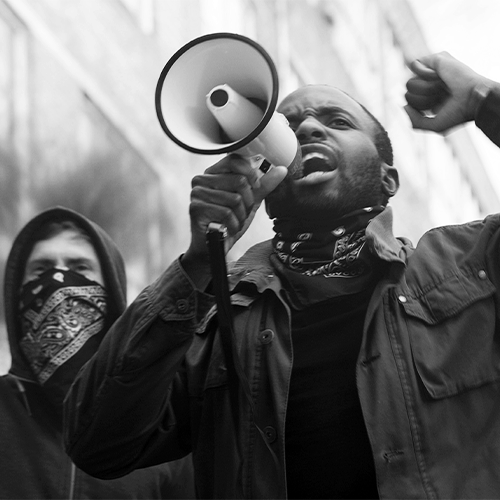Serious Disruption Prevention Orders | Public Order Act 2023

A Serious Disruption Prevention Order is one which allows courts to place requirements or prohibitions on any individual who is aged eighteen or over when considered appropriate to prevent that person from causing serious disruption.
This form of Order has been introduced by the Public Order Act 2023 (‘the Act’) to prevent individuals from repeatedly causing serious disruption to the wider community through protest activity. The intent is to ensure that that the Police will be better placed to balance the rights of protesters against those of the general public to attend to their daily businesses.
A Serious Disruption Prevention Order will generally be ordered on conviction or on application.
Sukhdip Randhawa of KANGS outlines the nature of an Order.
The Public Order Act 2023
Ordered on Conviction
Section 20: Serious Disruption Prevention Order made on Conviction
A court may make an Order, following application by the Prosecution, against a person aged eighteen or over who is convicted of a current offence if:
- the court is satisfied, on the balance of probabilities, that the current offence is a protest related offence,
- the court is satisfied that, within the previous five years, that person has been convicted of another protest offence or found in contempt of court for breach of injunction,
- the court considers it necessary to prevent, inter alia, the commission of a further protest-related offence, breach of an injunction, serious disruption to two or more individuals or an organisation or activities relating to a protest,
- the previous and current offences relate to different protests or took place on different days.
Ordered on Application
Section 21: Serious Disruption Prevention Order made on Application
A Magistrates’ Court may make a Serious Disruption Prevention Order against a person:
- aged 18 or over,
- upon application by an authorised person,
- where on at least two occasions in the previous five-year period that person has been convicted of a protest related offence or breached an injunction relating to a protest related breach and found in contempt of court,
- the court considers it necessary to make the Order to prevent further disruption of the nature specified to protect two or more individuals or an organisation.
Section 22: Provisions of Serious Disruption Prevention Order
The only requirements and prohibitions that may be imposed on a person by an Order are those which the Court making it considers necessary for further prevention and protection as set out in detail in Sections 20 (5) and 21 (4).
Such requirements and prohibitions may include:
- presentation of themselves to a particular person at a particular place at, or, between particular times on particular days,
- remaining at a particular place for a particular period,
- avoiding any particular place or area at a defined time,
- avoiding specified persons,
- not being in possession of specified items,
- not engaging with identified individuals.
Section 23: Requirements in Serious Disruption Prevention Order
Any Order imposing a requirement, other than a notification requirement, must specify the person responsible for supervising the compliance with that requirement.
Section 24: Notification Requirements in Serious Disruption Prevention Order
The person subject to the Order must notify the Police within three days of the Order taking effect:
- their name on the day that a notification is given and, where more than one name is used each of those names,
- their home address on that day and
- any other address regularly resided at.
Section 25: Duration of Serious Disruption Prevention Order
An Order must specify the period for which it has effect, and which must be for a fixed period of not less than one week and not more than two years.
Section 26: Other Information to be included in Serious Disruption Prevention Order
An Order must specify the:
- reason for which it was made and
- penalties which may be imposed for breaching it.
Section 27: Offences relating to a Serious Disruption Prevention Order
An individual subject to an Order commits an offence by:
- failing without reasonable excuse to do anything required,
- without a reasonable excuse, conducts prohibited act,
- deliberately notifying false information to the police.
An offence under this section may lead to a fine, a term of imprisonment or both.
Section 28: Variation, Renewal or Discharge of Serious Disruption Prevention Order
Where an Order has been made, application for an Order varying, renewing, or discharging it may be made by:
- the person against whom it is made,
- the appropriate Chief Officer of Police,
- varying Chief Constables.
The court may vary an Order to:
- extend the period for which it has effect,
- extend the period for which any requirement or prohibition has effect or
- impose an additional prohibition or requirement.
Additionally, the court may renew an Order if it considers that to do so is necessary for prevention of further conduct and protection of individuals or an organisation.
Section 29: Appeal against Serious Disruption Prevention Order
The person against whom the Order is made may appeal against it as if the Order amounted to a sentence passed for the offence.
How Can We Assist?
The Public Order Act 2003 has attracted much criticism and concern in relation to restrictions of liberty, the right to engage in peaceful protests and will undoubtedly continue to do so.
If you have been arrested or charged under the Public Order Act or anticipate being questioned about any criminal offence, it is imperative that you receive expert legal advice.
Please feel free to contact our Team to assist, we are here to help, simply call or email us using the details below:
Tel: 0333 370 4333
Email: info@kangssolicitors.co.uk
We provide an initial no obligation consultation from our offices in London, Birmingham, and Manchester. Alternatively, we provide initial consultations by telephone or video.






